
-
 LPGA, European tour partner with Saudis for new Vegas event
LPGA, European tour partner with Saudis for new Vegas event
-
Eyes turn to space to feed power-hungry data centers

-
 Jazz lose Kessler for season with shoulder injury
Jazz lose Kessler for season with shoulder injury
-
League scoring leader Messi among MLS Best XI squad

-
 MLS bans Suarez for Miami's winner-take-all playoff match
MLS bans Suarez for Miami's winner-take-all playoff match
-
McIlroy appreciates PGA of America apology for Ryder Cup abuse

-
 Garnacho equaliser saves Chelsea in Qarabag draw
Garnacho equaliser saves Chelsea in Qarabag draw
-
Promotions lift McDonald's sales in tricky consumer market

-
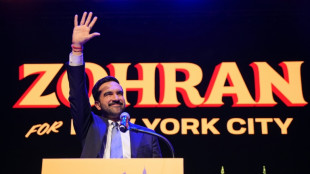 Five things to know about New York's new mayor
Five things to know about New York's new mayor
-
Anisimova beats Swiatek to reach WTA Finals last four

-
 US Supreme Court appears skeptical of Trump tariff legality
US Supreme Court appears skeptical of Trump tariff legality
-
AC Milan post third straight annual profit on day of San Siro purchase

-
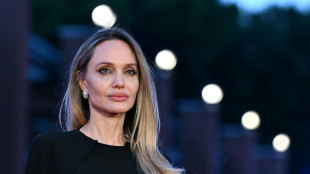 Angelina Jolie visits Ukrainian frontline city, media reports say
Angelina Jolie visits Ukrainian frontline city, media reports say
-
UN says forests should form key plank of COP30

-
 Star designer Rousteing quits fashion group Balmain
Star designer Rousteing quits fashion group Balmain
-
Mexico's Sheinbaum steps up cartel fight after murder of anti-narco mayor
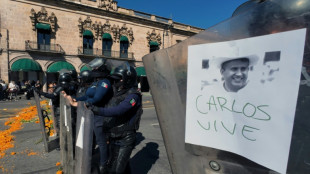
-
 Attack on funeral in Sudan's Kordofan region kills 40: UN
Attack on funeral in Sudan's Kordofan region kills 40: UN
-
Key PSG trio set for spell on sidelines

-
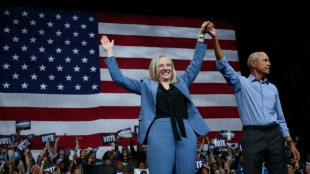 Democrats punch back in US elections - and see hope for 2026
Democrats punch back in US elections - and see hope for 2026
-
BMW reports rising profitability, shares jump

-
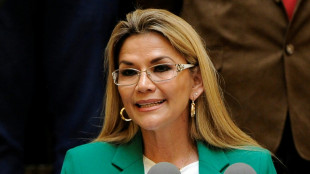 Bolivia Supreme Court orders release of jailed ex-president Jeanine Anez
Bolivia Supreme Court orders release of jailed ex-president Jeanine Anez
-
Wall Street stocks rise after positive jobs data
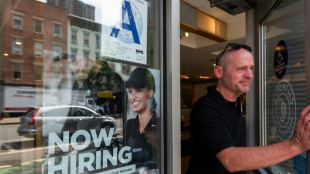
-
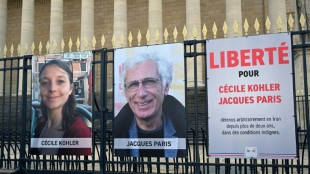 'Hostage diplomacy': longstanding Iran tactic presenting dilemma for West
'Hostage diplomacy': longstanding Iran tactic presenting dilemma for West
-
Rybakina stays perfect at WTA Finals with win over alternate Alexandrova

-
 Le Garrec welcomes Dupont help in training for Springboks showdown
Le Garrec welcomes Dupont help in training for Springboks showdown
-
Brussels wants high-speed rail linking EU capitals by 2040

-
 Swiss business chiefs met Trump on tariffs: Bern
Swiss business chiefs met Trump on tariffs: Bern
-
Spain's exiled king recounts history, scandals in wistful memoir

-
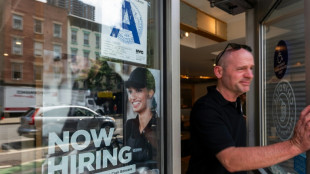 Wall Street stocks steady after positive jobs data
Wall Street stocks steady after positive jobs data
-
Trump blasts Democrats as government shutdown becomes longest ever
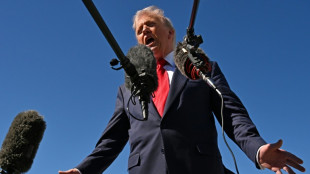
-
 Indian pilgrims find 'warm welcome' in Pakistan despite tensions
Indian pilgrims find 'warm welcome' in Pakistan despite tensions
-
Inter and AC Milan complete purchase of San Siro

-
 Swedish authorities inspect worksite conditions at steel startup Stegra
Swedish authorities inspect worksite conditions at steel startup Stegra
-
Keys withdraws from WTA Finals with illness

-
 Prince Harry says proud to be British despite new life in US
Prince Harry says proud to be British despite new life in US
-
EU strikes last-ditch deal on climate targets as COP30 looms

-
 Stocks retreat as tech bubble fears grow
Stocks retreat as tech bubble fears grow
-
Shein opens first permanent store amid heavy police presence

-
 West Indies edge New Zealand despite Santner brilliance
West Indies edge New Zealand despite Santner brilliance
-
French pair released by Iran await return home

-
 German factory orders up but outlook still muted
German factory orders up but outlook still muted
-
Death toll tops 100 as Philippines digs out after typhoon

-
 Attack on key city in Sudan's Kordofan region kills 40: UN
Attack on key city in Sudan's Kordofan region kills 40: UN
-
'No one could stop it': Sudanese describe mass rapes while fleeing El-Fasher

-
 Champagne and cheers across New York as Mamdani soars to victory
Champagne and cheers across New York as Mamdani soars to victory
-
Medieval tower collapse adds to Italy's workplace toll

-
 BMW boosts profitability despite China, tariff woes
BMW boosts profitability despite China, tariff woes
-
South Africa's Wiese wary of 'hurt' France before re-match

-
 Beyond limits: Croatian freediver's breathtaking record
Beyond limits: Croatian freediver's breathtaking record
-
Tottenham supporting Udogie after alleged gun threat in London


Jihadists in Nigeria turn to TikTok to spread propaganda
Jihadists in northeastern Nigeria are surging -- and using social media to spread the word of their campaigns and recruit fighters.
At least 100 people were killed in the new wave of jihadist attacks in April alone, as the governor of Borno, the epicentre of the violence which has raged since 2009, said the state is losing ground to armed groups.
At the same time, apparent jihadists and their boosters on TikTok were flaunting rifles, grenades and stacks of cash, according to easily accessible videos reviewed by AFP that same month.
They broadcast live in joint videos with accounts run by men preaching anti-Western ideologies in a style reminiscent of the videos released by deceased Boko Haram leader Abubakar Shekau in the early days of the 15-year-old insurgency.
Criminal gangs that carry out raids on villages and kidnap for ransom in the northwest of the country have used TikTok in the past.
"It started with bandits," Bulama Bukarti, a vice president at Texas-based Bridgeway Foundation wrote on X. "Now, Boko Haram members are hosting live TikTok shows -- spreading propaganda, justifying their violence and threatening anyone who dares speak against them."
A Boko Haram fighter threatened Bukarti himself in a now-deleted TikTok video for speaking against the group, he said.
While many of the accounts on the video sharing app have been flagged and taken down, the capability of broadcasting live streams on the platform adds another layer of difficulty to monitoring the content they put out.
A TikTok spokesperson said it was difficult to quantify the number of accounts linked to terrorist organisations that have been taken down.
While some of these accounts have been deleted, several others remain active, according to accounts viewed by AFP at the time of publication.
"Terrorist groups and content related to these groups have no place on TikTok, and we take an uncompromising stance against enabling violent extremism on or off our platform," a spokesperson for the company told AFP in an emailed statement.
- 'It's paying off' -
Among the 19 accounts reviewed by AFP were men dressed as clerics, their faces revealed to the camera even as they called for violence against the government and teamed up with accounts that showed off weapons hauls.
Accounts also post old footage of the original Boko Haram founder, Mohammed Yusuf, and those of Isah Garo Assalafy, who was banned from preaching in public places in Niger state for using violent rhetoric against democracy and Western civilisation.
These accounts frequently go live, interacting with followers, answering questions and receiving digital gifts that can be converted into cash.
Nigeria's jihadist conflict, which over the years has expanded to include a rival Islamic State group, has killed more than 40,000 and displaced some two million people in Africa's most populous country.
Saddiku Muhammad, a former jihadist who has since defected, told AFP that armed groups are turning to TikTok in part because security forces cracked down on the encrypted messaging app Telegram.
They also know TikTok is popular with young people.
"Jihadists realised that to capture the minds of young people, they need to speak to them in the language they understand -- instead of the traditional didactic and demagogic styles that are boring and unattractive to them," Muhammad said.
"From all indications, it is paying off. They are reaching out to young potential recruits."
- 'They aren't afraid' -
Analysts told AFP that the use of TikTok by members of armed groups is a direct challenge to the government.
Malik Samuel, an Abuja-based security analyst at the pan-African think tank Good Governance Africa, said it is a common Boko Haram tactic to use the group's young members to spread propaganda.
"I believe showing their faces is strategic -- to show that they aren't afraid and to let their target know that they are engaging with real people," Samuel said.
Islamic State West Africa Province, however, still appears to follow a more polished, top-down communication strategy than the apparent Boko Haram jihadists posting on TikTok, he said.
TikTok said it has partnered with UN-backed Tech Against Terrorism to improve the detection and removal of violent extremist content.
"Our community guidelines clearly state that we do not allow the presence of violent and hateful organisations or individuals on our platform," it said.
"We will always take action on content found to violate these policies."
G.Schmid--VB



